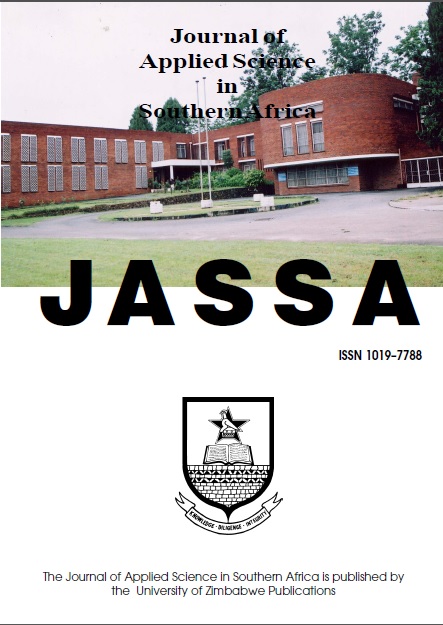
JOURNAL OF APPLIED SCIENCE IN SOUTHERN AFRICA
University of Zimbabwe Publications
DOI: 10.5897/UJ-JASSA
Email: uzpub@admin.uz.ac.zw
Changes in ABO blood group frequencies in mental health patients in Zimbabwe
DOI: 10.5897/UJ-JASSA.17.003.2 | Article Number: 04632D5A3 | Vol.22 (2) - December 2016
Authors: Zuze M. , Mandisodza A. , Chakachaka K. , Maramba A. , Maunganidze G. , Mangezi W. and Chikwasha V.
Keywords: ABO blood groups, mental illness, von Willebrand, blood group frequencies, haemostatic disorders
Blood group antigens are inherited characteristics which are grouped into 15 systems based on genetic, structural, biochemical and serological or immunological characteristics. The exact role of the blood group antigens is not yet fully understood, but recent studies have indicated some relationships between some blood group antigens and certain diseases or successes in transplantations. Some haemolytic anaemia due to membrane disorders are directly associated with abnormal or absence of certain blood groups. Other blood groups have been implicated in mental health and bleeding challenges. ABO blood group antigens are ubiquitous and are found in all body tissues. A cross sectional study was carried out at the Annex Hospital to determine the distributions of the ABO blood groups in mental health patients for a period of six months. AB and B blood group frequencies increased to 11.1% and 27% compared to 3.7% and 19.2% in the general population respectively. A and O blood group frequencies decrease to 21.6% and 39.9%, compared to 25.3% and 51.8 % in the general population respectively. Both changes were statistically significant. It can be concluded that ABO blood groups, especially AB and B, are associated with mental illnesses. The understanding of blood type and plasma von Willebrand levels would be useful in the screening, diagnosis and management of mental illness in Zimbabwe. However, ethical consideration and stigmatization associated with this approach must be taken into account. A follow up study using a larger sample size is recommended.
ALEXANDER, K.S., ZAKAI, N.A., GILLETT, S., MCCLURE, L.A., WADLEY, V., UNVERZAGT, F., ET AL. 2014. ABO blood type, factor VIII, and incident cognitive impairment in the REGARDS cohort. Neurology, 83 (14):1271-6.
BOORMAN, C.E., DODD, B.E., LINCOLN, P.J. 1977. Introduction to Blood Group Serology. Blood Group Serology, 5th Edition. Churchill Livingstone, London: 3-46.
Bowen DJ, 2003. Influence of ABO blood group on the rate of proteolysis of von Willebrand by DAMTS-13. Journal of Thrombosis and Haemostasis, 1 (1): 33- 40.
DACIE, J.V. AND LEWIS, S.M., 1991. Hereditary Haemolytic Anaemia. Practical Haematology, 7th Edition, Churchill Livingstone, London: 143-291.
DENTALI, F., SRONI, A.P., AGENO, W., CRESTANI, S., FRANCHINI, M.. 2014. ABO blood group and vascular diseases: an update. Seminars in Thrombosis and Haemostasis, 40: 49-59.
DE MARCO, M.. AND VENNERI, A., 2015. O blood type is associated with larger grey- matter volume in the cerebellum. Brain Research bulletin, 116: 1-6.
FRANCHINI, M., CAPRA, F., TARGHER, G., MONTAGNANA, M., LIPPI, G., 2007. Relationship between ABO blood groups and von Willebrand factor levels: from biology to clinical implications. Thrombosis Journal, 5 (1): 14.
FRANCHINI, M. AND LIUMBRUNO, G.M., 2016. ABO blood group and neurodegenerative disorders: more than a casual association. Blood Transfusion, 14 (2): 158-159.
GALLINAROL, CATTININ, M.G., SZTUKOWSKA, M., PADRINI, R., SARTORELLO, F., PONTARA, E. et al, 2008. A shorter von Willebrand factor survival in O blood group subjects explains how ABO determinants influence plasma von Willebrand factor levels. Blood, 111 (7): 3540-3545.
HOFFBRAND, A.V. AND MOSS, P.A., 2011. Hereditary haemolytic anaemia,-membrane defects. Essential Haematology,6th Edition, Wiley-Blackwell, West Sussex: 77- 79.
HOBGOOD, D.K., 2011. Personality traits of aggression-submissiveness and perfectionismassociated with ABO blood groups through catecholamine activities. Medical Hypotheses,77 (2): 294-300.
HOPE, S., MELLE, I., AUKRUST, P., STEEN, N.E., BIRENAES, A.B., LORENTZEN, S. et al. 2009. Similar immune profile in bipolar disorder and schizophrenia: selective increase in soluble tumour necrosis factor receptor 1 and von Willebrand factor. Bipolar Disorders,11 (7):726-734.
HOWES, O.D. AND KAPUR, S.. 2009. The dopamine hypothesis of Schizophrenia: Version III- the final common pathway. Schizophrenia Bulletin, 35 (3): 549-562.
JEREMIA, Z.A., 2006. Abnormal haemoglobin variants, ABO and Rhesus blood groups among students of African descent in Port Harcourt, Nigeria. African Health Sciences, 6(3) 177-181.
MANDISODZA, A., MAPAKO, T., MVERE, D., MUSEKIWA, Z., MAUNGANIDZE, G., CHIKWANHA, T. 2011. ABO and Rhesus D blood group distribution in the Zimbabwean donor population. Africa Sanguine, 14(1): 4-6.
MASTERS, A.B. 1967. The distribution of blood groups in psychiatric illness. Journal of Psychiatry, 113(504): 1309-15.
O’DONNELL, J. AND LAFFAN, M.A. 2001: The relationship between ABO blood group, factor VIII and von Willebrand factor. Transfusion Medicine, 11(4): 343-351.
ORSTAVK, K.H., MAGNUS, P., REISNER, H., BERG, K., GRAHAM, J.B., NANCE, W.. 1985. Factor VIII and IX in twin population: evidence of major effect of ABO locus on factor VIII levels. American Journal of Human Genetics, 37 (1): 89-101.
PETZ, L.D. AND SWISHER, S.N., 1989. Blood Groups. Clinical Practice of Transfusion Medicine, 2nd Edition, Churchill Livingstone, New York: 59-134.
PURCELL, S.M., WRAY, N.R., STONE, J.L., VISSCHER, P.M., O’DONOVAN, M.C. et al., 2009. Common polygenic variation contributes to risks of Schizophrenia and bipolar disorders. Nature, 460(7256): 748-52.
ROBACK, J., COMB, M.R., GROSSMAN, B., HILLYER, C. 2008. Technical Manual, 16th Edition, American Association of Blood Banks (AABB) 50-200.
SATCHER, D., 2000. Mental Health: A report of the Surgeon-General- exclusive summary. International Journal of Psychological Rehabilitation, 31 (1): 5-13.
STORRY, J..R.. AND OLSSON, M.L. 2009. The ABO blood group system revisited: a review and update. Immunohaematology, 25(2): 48-59.
TRIVEDI, J. K., 2006. Cognitive deficits in psychiatric Disorders: current status. Indian Journal of Psychiatry, 48 (1):10-20.
WALKER, R.H., HOPPE, A., JUDD, W.J., NESS, P., POLESKY, H.F, ROLIH, S.D. et al. 1990. ABO, H and P Blood Groups and Structurally Related Antigens. Technical Manual,10th Edition, American Association of Blood Banks (AABB), Arlington VA: 173-193.
WRAY, J., PARKER, J., GOOCH, A., QURESHI, H., 2007. Transfusion Medicine, 17 (4): 252-62.
ZAKAI, N.A., Judd, S.E., Alexander, K., Mcclure, L.A., Kissella, B.M., Cushman, M., 2014. ABO blood type and stroke risks: the reason for geographic and racial differences (REGARD) in stroke studies. Journal of Thrombosis and Haemostasis, 12(4):564-70.
